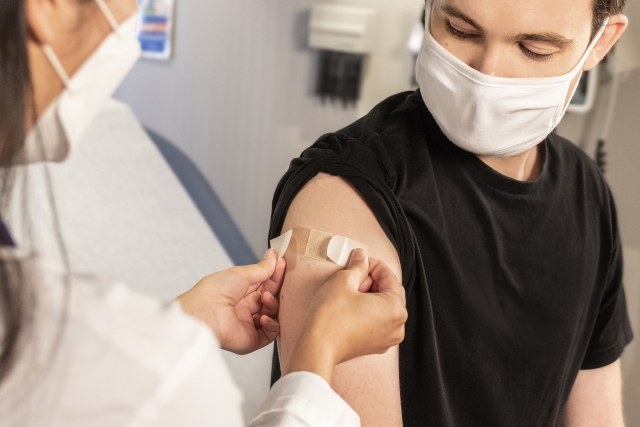People's negative expectations and general attitudes towards the COVID-19 vaccine are significantly correlated with the occurrence and intensity of its most common side effects such as fatigue, muscle pain, headache and injection site pain. This is suggested by a study published in the Psychological Science journal and led by scientists from the University of Bologna, who investigated how adverse effects reported after vaccination can be influenced by the nocebo effect, the opposite of the placebo effect.
"People who expect to develop adverse effects following COVID-19 vaccination are more likely to develop those same adverse effects than those who do not have negative expectations. Indeed, psychological variables such as beliefs about vaccines, fear, trust and expectations explain 30 % of the intensity of symptoms," explains Katia Mattarozzi, professor at the Department of Medical and Surgical Sciences at the University of Bologna and first author of the study. "This result underlines the contribution of nocebo effects, i.e. neuro-psycho-biological mechanisms linked to an individual's prior experiences, beliefs and expectations, which are activated whenever a person takes a pharmacological molecule and which influence its pharmacodynamics."
Vaccines against the SARS-CoV-2 coronavirus are the main tool to prevent severe forms of COVID-19 and to reduce viral circulation and the development of new variants. Although rigorous scientific studies have provided solid data on the safety and efficacy of these vaccines, many people have approached vaccination worried about the possible development of adverse effects.
Therefore, a team of scientists from the Department of Medical and Surgical Sciences at the University of Bologna, in collaboration with a number of international research laboratories, decided to investigate whether and to what extent fear, expectations and beliefs about the vaccine have an effect on the occurrence and severity of possible adverse effects. This is referred to as the 'nocebo effect', a phenomenon that occurs as a consequence of negative expectations and beliefs, which can activate or reinforce possible side effects.
The researchers took a sample of 315 people and, during the 15-minute waiting time following vaccination, investigated their expectations, fears and beliefs about the COVID-19 vaccine, their trust in health and scientific institutions, and certain personality traits. The presence and severity of any adverse effects was then reported one day later.
"The results indicate that in the following 24 hours, consistent with the numerous studies on vaccination efficacy and safety, no participant reported any side effects that required medical intervention. The most commonly reported adverse effects were fatigue, muscle pain, headaches and injection site pain," says Mattarozzi. "The most relevant finding to emerge from this study is that psychological factors, such as an individual's beliefs and attitude towards the COVID-19 vaccine, contribute significantly to the onset and severity of adverse effects and explain 30% of the variability in their onset and intensity."
The data collected showed that the reported symptoms could not always be explained solely by the pharmacological and biological properties of the COVID-19 vaccine, thus showing a role for the nocebo effect.
"The results of our study confirm and emphasise how important it is to build a solid climate of trust around the COVID-19 vaccination, particularly for older age groups, that most often show a negative attitude towards the vaccine," Mattarozzi explains. "In this sense, health professionals, scientific institutions, governments, and the media share a responsibility to effectively communicate the benefits and potential adverse effects of vaccines, with the aim of increasing vaccine acceptance in the population, understanding of its important benefits for individual and collective health, and preventing nocebo effects."
The study was published in a prestigious international scientific journal, Psychological Science, with the title “No(cebo) Vax: COVID-19 Vaccine Beliefs Are Important Determinants of Both Occurrence and Perceived Severity of Common Vaccines' Adverse Effects”. Participating for the University of Bologna (Department of Medical and Surgical Sciences) were Katia Mattarozzi, Arianna Bagnis, Valeria Cremonini, Arianna Fabbri, Vittorio Sambri and Paolo Maria Russo. They also worked with: Joanna Kłosowska and Przemysław Bąbel (Jagiellonian University, Poland), Alessandra De Palma (IRCCS Azienda Ospedaliero-Universitaria di Bologna - Policlinico di Sant'Orsola), Elisa Farinella (Ravenna Medical Center GVM Care & Research), Lucrezia Puccini and Simona Semprini (Single Laboratory of the AUSL of Romagna).

